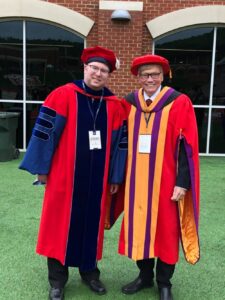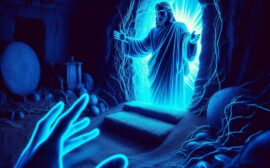By: Daniel Sloan, Ph.D. | October 20, 2024
One of the questions that people ask when they read through the Old Testament is “did those little statues that people worshipped actually have any power behind them?” Most scholars agree that people believed that the idols themselves did not hold power but instead represented the pagan gods. The Old Testament itself has two major views on idolatry, one located in the prophets and another located in Deuteronomy.
Idolatry in the Prophets
The prophets identify idolatry as a major issue within both Israel and Judah during their time and argue that idolatry is worthless. For example, in Isaiah 41, Isaiah 44 and Jeremiah 10, the prophets make it clear that idolatry is useless and meaningless. It holds no power because the idols themselves are created and the gods that they represent were also created by mankind. The gods cannot deliver the nations, cannot create, cannot predict the future and therefore should not be worshipped. Thus, if you only had the prophets, one would probably assume that there was no actual spiritual or supernatural power behind the idols or their gods.
Idolatry in Deuteronomy
However, the Book of Deuteronomy lays out a different argument when it comes to idolatry. In Deuteronomy 32:17 it states, “They sacrificed to demons, not to God, to gods they did not know, to new gods, new arrivals that your fathers did not fear.” (NKJV) Paul similarly made this argument in 1 Corinthians 10:20 when he wrote, “Rather, that the things which the Gentiles sacrifice they sacrifice to demons and not to God, and I do not want you to have fellowship with demons.” (NKJV) From this perspective it seems that the idols and their gods were not simply worthless creations of mankind but were instead powered by demons and Satanic forces.
How Do We Reconcile These Two Views?
The question then becomes were the idols and their gods worthless creations of mankind or supernatural beings empowered by Satan and his demonic horde? The answer seems to lie somewhere in the middle. It is true that the idols, at least to some extent, did have some type of supernatural force behind them. The people of the ancient world called these supernatural powers gods, whereas the Bible calls them instead demons. Indeed, it is unlikely that the ancients would have worshipped idols for generations if there was not some kind of supernatural power behind them, probably coming from the demonic realm to trick people into worshipping these gods as divine. A possible example of this can be seen in the story of the Exodus, when Pharaoh’s magicians can replicate some of the supernatural abilities of Moses and Aaron, at least with the first few plagues, even if their power was limited and they could not duplicate any of the plagues after the plague of frogs.
However, the prophets were also correct is their arguments that the idols and their gods were not equal to YHWH. Demons are created beings that are fallen angels. They are not co-equal to YHWH and therefore are inferior to Him. While the prophets may have downplayed the supernatural elements that the idols could have exhibited, they were correct in arguing that these pagan gods were not comparable to YHWH. Michael Heiser said it well when he wrote, “No. These “denial statements” do not deny that other elohim exist. Rather, they deny that any elohim compares to Yahweh.”[1]
Therefore, the answer to the question did the Old Testament gods have power is yes, they did seem to have some type of supernatural power through the power of Satan and his demons. Nonetheless, this does not mean that they were equal to YHWH and deserved to be worshipped and trusted as true gods. Only YHWH is the one true God, incomparable within creation. Isaiah 44:8 clarifies this well when it states, “Do not fear, nor be afraid; Have I not told you from that time, and declared it? You are My witnesses. Is there a God besides Me? Indeed there is no other Rock; I know not one.’ ” (NKJV)
About the Author
 Daniel Sloan is an Assistant Professor at Liberty University. He was mentored by the late Dr. Ed Hindson. After Dr. Hindson’s untimely passing, Dr. Sloan was allowed to teach some of Dr. Hindson’s classes. In addition to his teaching duties, Dr. Sloan serves as an Associate Pastor at Safe Harbor Community Church in Lynchburg, Virginia. Daniel graduated with his PhD in Theology and Apologetics from Liberty University. His research and expertise is in Old Testament studies. He and his wife, Natalie, live in Lynchburg, Virginia. Along with his extensive knowledge of the Bible, Daniel is an avid sports fan.
Daniel Sloan is an Assistant Professor at Liberty University. He was mentored by the late Dr. Ed Hindson. After Dr. Hindson’s untimely passing, Dr. Sloan was allowed to teach some of Dr. Hindson’s classes. In addition to his teaching duties, Dr. Sloan serves as an Associate Pastor at Safe Harbor Community Church in Lynchburg, Virginia. Daniel graduated with his PhD in Theology and Apologetics from Liberty University. His research and expertise is in Old Testament studies. He and his wife, Natalie, live in Lynchburg, Virginia. Along with his extensive knowledge of the Bible, Daniel is an avid sports fan.
Notes
[1] Michael S. Heiser, “Does Divine Plurality in the Hebrew Bible Demonstrate an Evolution from Polytheism to Monotheism in Israelite Religion?,” Journal for the Evangelical Study of the Old Testament 1, no. 1 (2012): 8-9.





